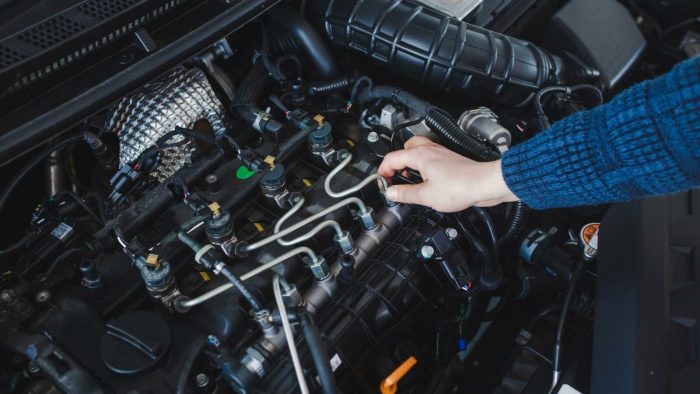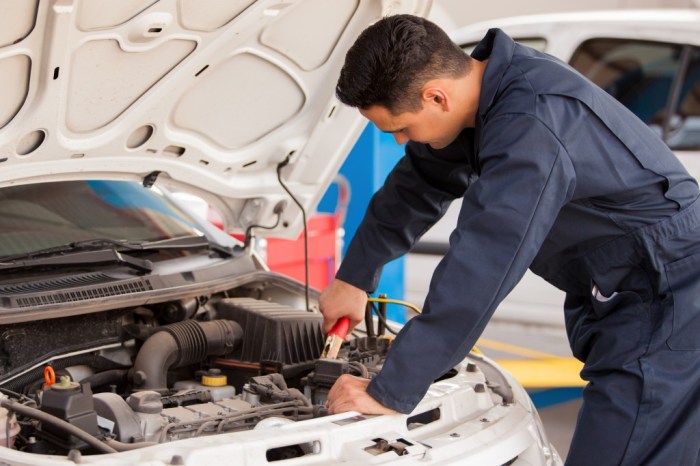The importance of regular car engine tune-ups is crucial for maintaining your vehicle’s performance and longevity. Neglecting this essential maintenance can result in costly repairs and breakdowns, making it vital to stay on top of your tune-up schedule.
Regular tune-ups not only ensure optimal engine function but also help in detecting issues early on, preventing major problems down the road. In this guide, we will explore the significance of tune-ups and how they can benefit your car in the long run.
Importance of Regular Car Engine Tune-ups

Regular tune-ups are crucial for maintaining the health and longevity of your car’s engine. By keeping up with scheduled tune-ups, you can ensure that your engine is running efficiently and smoothly, ultimately saving you money in the long run.
Benefits of Maintaining a Consistent Tune-up Schedule
- Improved fuel efficiency: A well-tuned engine can help improve gas mileage, saving you money at the pump.
- Prevent major breakdowns: Regular tune-ups can catch minor issues before they escalate into costly repairs.
- Extended engine life: Proper maintenance can help extend the lifespan of your engine, avoiding the need for premature replacements.
Consequences of Neglecting Tune-ups
- Decreased performance: Neglecting tune-ups can lead to decreased engine performance, resulting in sluggish acceleration and overall poor driving experience.
- Increased emissions: An improperly tuned engine can produce higher emissions, contributing to environmental pollution.
- Risk of engine damage: Ignoring tune-ups can lead to serious engine damage, requiring expensive repairs or even engine replacement.
Signs That Indicate the Need for a Tune-up
Regular car engine tune-ups are essential to ensure optimal performance and prevent major breakdowns. By recognizing the signs that indicate the need for a tune-up, you can address issues early on and maintain your vehicle’s efficiency.
When a car is overdue for a tune-up, there are several common symptoms that may manifest, signaling the need for immediate attention. These signs include:
1. Decreased Fuel Efficiency
- Engine misfires
- Difficulty starting the car
- Decreased miles per gallon
2. Rough Idling or Stalling
- Shaky or vibrating engine
- Inconsistent idling speed
- Frequent stalling
3. Lack of Power and Acceleration
- Sluggish response when accelerating
- Difficulty reaching higher speeds
- Lack of power when climbing hills
4. Unusual Engine Noises
- Pinging or knocking sounds
- Squealing or screeching noises
- Rattling or banging sounds
5. Warning Lights on the Dashboard
- Check Engine Light
- Service Engine Soon Light
- Other warning indicators related to engine performance
By paying attention to these signs and addressing them promptly with a tune-up, you can prevent major engine issues and costly repairs down the line. Regular maintenance is key to keeping your car running smoothly and efficiently, ensuring a longer lifespan for your vehicle.
Components Checked During a Tune-up
Regular tune-ups involve inspecting various key components of a car’s engine to ensure optimal performance and longevity.
Spark Plugs
- Spark plugs are crucial for igniting the air-fuel mixture in the engine cylinders.
- Worn-out spark plugs can lead to misfires, poor fuel economy, and engine performance issues.
- Replacing spark plugs during a tune-up ensures efficient combustion and smooth engine operation.
Air Filter
- The air filter prevents dirt, debris, and contaminants from entering the engine.
- A clogged air filter restricts airflow, reducing engine efficiency and power.
- Regularly replacing the air filter during a tune-up improves fuel economy and overall engine performance.
Fuel Filter
- The fuel filter traps impurities and debris from the fuel before it reaches the engine.
- A dirty fuel filter can lead to fuel system issues, poor acceleration, and engine stalling.
- Replacing the fuel filter as part of a tune-up ensures proper fuel delivery and engine function.
Ignition System
- The ignition system includes components like ignition coils, wires, and distributor caps.
- Faulty ignition components can cause starting problems and engine misfires.
- Inspecting and replacing worn ignition parts during a tune-up enhances engine performance and reliability.
Frequency and Timing of Tune-ups

Regular car engine tune-ups are essential for maintaining optimal performance and extending the lifespan of your vehicle. To ensure your car continues to run smoothly, it is important to schedule tune-ups at appropriate intervals.
Factors such as mileage and driving conditions play a significant role in determining how often a tune-up is needed. As a general guideline, most manufacturers recommend scheduling a tune-up every 30,000 miles or every two years, whichever comes first. However, if you frequently drive in stop-and-go traffic, tow heavy loads, or often drive in extreme weather conditions, more frequent tune-ups may be necessary.
Adhering to the manufacturer’s recommendations for tune-up intervals is crucial to prevent potential issues and keep your engine in top shape. Ignoring or delaying tune-ups can lead to decreased fuel efficiency, engine misfires, and even more severe problems that could result in costly repairs.
Factors Influencing Tune-up Frequency
- High mileage: Vehicles with high mileage typically require more frequent tune-ups to ensure continued performance.
- Driving conditions: Stop-and-go driving, towing, and extreme weather conditions can accelerate wear and tear on engine components, necessitating more frequent tune-ups.
- Age of the vehicle: Older vehicles may require more frequent tune-ups to address wear and tear on components over time.
- Maintenance history: Regular maintenance can help extend the time between tune-ups, while neglected maintenance may require more frequent tune-ups to address issues.
DIY vs. Professional Tune-ups: The Importance Of Regular Car Engine Tune-ups
When it comes to car engine tune-ups, you have the option to either do it yourself (DIY) or seek professional mechanic services. Both have their pros and cons, so let’s break it down to help you make an informed decision.
Benefits of DIY Tune-ups, The importance of regular car engine tune-ups
- You can save money by not having to pay for labor costs.
- You have control over the quality of parts used in the tune-up.
- You can learn more about your car and gain valuable skills in the process.
- You can work on your own schedule and at your own pace.
Benefits of Professional Tune-ups
- Professional mechanics have the necessary expertise and experience to perform tune-ups correctly.
- They have access to specialized tools and equipment that may not be available to DIYers.
- Professional tune-ups may come with warranties or guarantees on the work done.
- You can save time and effort by letting experts handle the job quickly and efficiently.
Risks of DIY Tune-ups
- Without the proper knowledge and skills, you may end up causing more harm than good to your vehicle.
- Using incorrect parts or procedures can lead to further damage and costly repairs.
- DIY tune-ups may void your vehicle’s warranty if not done correctly.
Tips for DIY Tune-ups
- Research thoroughly and follow step-by-step guides or tutorials from reputable sources.
- Invest in quality tools and parts to ensure the job is done right.
- Take your time and don’t rush through the process to avoid mistakes.
- If in doubt, don’t hesitate to seek advice from experienced DIYers or consult a professional mechanic.
Ultimate Conclusion
Don’t overlook the importance of regular car engine tune-ups – they are key to keeping your vehicle in top shape and avoiding unexpected breakdowns. By staying proactive with maintenance, you can save money on repairs and enjoy a smoother driving experience.
When comparing fuel efficiency in popular car models, it’s essential to consider factors such as engine size, weight, and aerodynamics. Some models excel in this aspect, providing great mileage per gallon. You can find a detailed comparison of fuel efficiency in popular car models here.
For families with children, safety is a top priority when choosing a car. Features like advanced airbags, stability control, and collision warning systems are crucial. Discover the safest cars for families with children here.